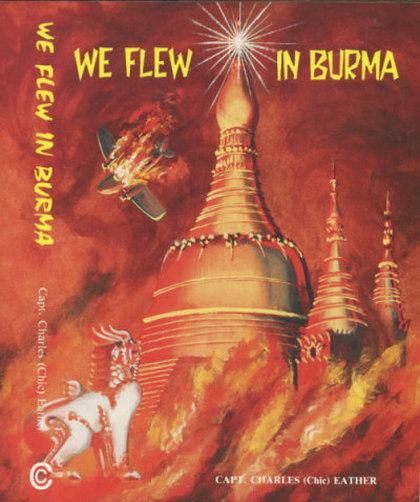WE FLEW IN BURMA

WE FLEW IN BURMA
by Capt. Charles (Chic) Eather - Author of “Syd's Pirates”
Almost from the beginning Burma has been a way-station for the pioneer flier. The remembered and the forgotten have thundered through her skies. Her rugged mountains claimed several. Still others rest in the depths of her restless seas.
The Japanese invasion during World War II brought into being the perilous Burma Road and the birth of the legendary pilots of Chennault's Fying Tigers.
With war's end, Britain gave Burma independence. This brought confusion and led to Ne Win grabbing control. Almost unabated the insurgent Karens advanced. They gained control of most of the country and the people began to starve. For a price, foreign aviators brought succour to the hungry. The Rangoon aerodrome at Mingaladon became the main point of supply.
The Karen high command ordered the capture of Mingaladon. Their occupation lasted less than a day. They inflicted minor damage and erred by not burning the BAF planes. Cathay Pacific's ground engineers witnessed this through a field of waving wheat and liquor fumes. The result of grog they purloined from an abandoned restaurant - the infamous Moutrie's “Palace of Germs”.
In Burma, the people joined the Allied cause but the Japanese are not their only modem invader, the fleeing Chinese KMT forces established the opium trade and the infamous Golden Triangle thrives to this day.
Among serious incidents are dozens of humorous anecdotes: the “Three Wise Virgins”, paradoxically ladies-of-the-evening, a lottery for the most bullet holes in the planes; the confusion of Kipling's famous pagoda at Moulmein; the inside story of Cannon's historic “moonlight flit”.
Why has the world abandoned this gentle race? The charismatic Aung San Suu Kyi holds the 1991 Nobel Peace Prize. Winning landslide election in 1990, she remains defiant under home-arrest.
How long will 38,000,000 million people be bullied by a 180,000 military force? It can't be much longer!
The Japanese invasion during World War II brought into being the perilous Burma Road and the birth of the legendary pilots of Chennault's Fying Tigers.
With war's end, Britain gave Burma independence. This brought confusion and led to Ne Win grabbing control. Almost unabated the insurgent Karens advanced. They gained control of most of the country and the people began to starve. For a price, foreign aviators brought succour to the hungry. The Rangoon aerodrome at Mingaladon became the main point of supply.
The Karen high command ordered the capture of Mingaladon. Their occupation lasted less than a day. They inflicted minor damage and erred by not burning the BAF planes. Cathay Pacific's ground engineers witnessed this through a field of waving wheat and liquor fumes. The result of grog they purloined from an abandoned restaurant - the infamous Moutrie's “Palace of Germs”.
In Burma, the people joined the Allied cause but the Japanese are not their only modem invader, the fleeing Chinese KMT forces established the opium trade and the infamous Golden Triangle thrives to this day.
Among serious incidents are dozens of humorous anecdotes: the “Three Wise Virgins”, paradoxically ladies-of-the-evening, a lottery for the most bullet holes in the planes; the confusion of Kipling's famous pagoda at Moulmein; the inside story of Cannon's historic “moonlight flit”.
Why has the world abandoned this gentle race? The charismatic Aung San Suu Kyi holds the 1991 Nobel Peace Prize. Winning landslide election in 1990, she remains defiant under home-arrest.
How long will 38,000,000 million people be bullied by a 180,000 military force? It can't be much longer!
Copies of this book may be available over the internet.

